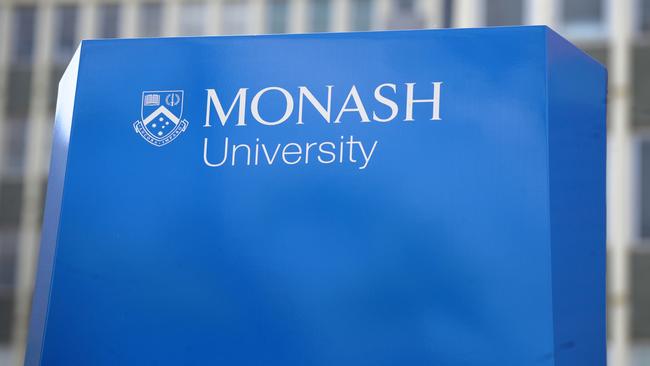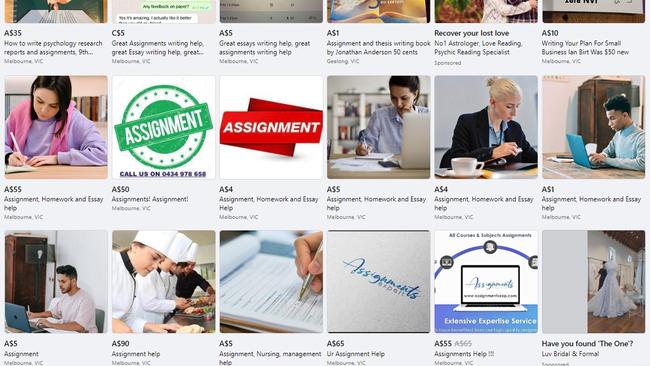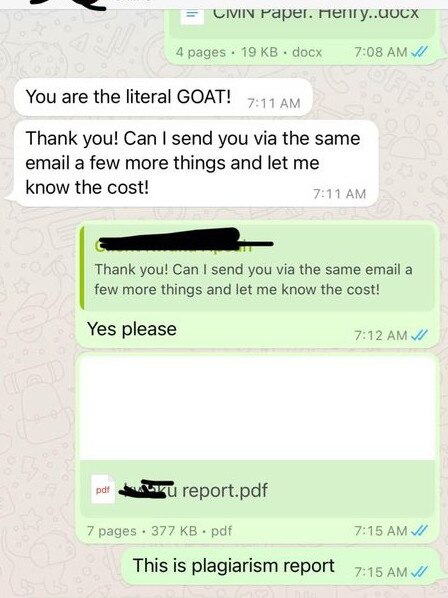Major cheating rings busted at universities
Hundreds of university students have been busted paying others to do their assignments as part of a “sophisticated cheating network” scheme.

Tertiary
Don't miss out on the headlines from Tertiary. Followed categories will be added to My News.
Hundreds of dodgy contract cheating businesses are risking jail time and threatening academic integrity by writing university assignments for cash.
Scores of advertisements for Melbourne-based cheating and assignment-writing businesses are listed on sites including Facebook Marketplace, Airtasker and Gumtree.
Sellers offer free or extremely cheap assessment help in their listings, before messaging cheating students privately with prices based on word count and the amount of research involved.
Posing as a university student, the Herald Sun contacted several businesses, who quoted anywhere between $90 and $240 for a 3000-word research essay with a plagiarism report and a bibliography.
Most companies promised an original assignment in as little as three days, but sample essays obtained were riddled with spelling and grammatical errors.
Federal laws brought in to target the illegal service have failed to deter students from using professional assignment writers promising “plagiarism free” work who brazenly list their services online.

Just weeks ago, Monash University discovered a “sophisticated contract cheating network” operating among its students.
Two hundred and thirty eight contract cheating incidents were reported at Deakin in 2021.
Eleven students were expelled over the offence last year, while 42 others were suspended and 185 students either failed their unit entirely or failed their assignment.
Twenty-nine Monash students were caught contract cheating last year, revealing the laws have not deterred cheating students and businesses.
A Monash spokeswoman said that figure had not changed from previous years, and students risk being expelled if caught submitting contracted assessments.
“Monash University does not tolerate any form of academic or research misconduct,” she said.
“Students may either be required to resubmit their work in order to pass or a fail grade for the work or suspension or exclusion from the University may be applied,” she said.

Specific contract cheating data for Swinburne was unavailable, but 322 students were either warned or disciplined for cheating and plagiarism in 2021.
A spokesman for the university said contract cheating websites are blocked by the university’s servers as all institutions worked to stamp out the service.
Victoria University would not provide their data, but a spokeswoman said policies were updated last year as hundreds of teaching staff were trained to use anti-cheat technology.
Deakin University’s Deputy Vice-Chancellor Professor Liz Johnson, who oversees the university’s curriculum and student experience, said contract cheating was a “serious risk’’ to universities, and students’ academic futures.
“With recent national research showing up to 6 per cent of students admit cheating behaviours, we must continue to improve our methods,” she said.
“Deakin ensures our students understand that all forms of academic misconduct, including contract cheating, aren’t worth the serious risk to their university careers.
“We continue developing and improving our tools to detect contract cheating, including investigating historical cases.
A federal Department of Education spokesman said the Tertiary Education Quality and Standards Agency (TEQSA), Australia’s national watchdog, identified about 500 illegal companies that continue to sell assignments to Australian university students.
“TEQSA is working with social media and online marketplaces including Meta, LinkedIn and Gumtree to remove posts and accounts promoting or offering commercial cheating services,” he said.
“More than 300 social media posts have been removed – and more accounts and posts are being identified for removal.”
People running the service on a commercial scale face up to two years’ jail and a $110,000 fine, with a national crackdown on the most popular sites expected in the coming weeks.
The law, passed in June last year, defines contract cheating as “assistance to students that forms a substantial part of an assessment task that students are required to personally undertake”.
Companies are busiest outside peak exam and assessment periods, with data showing search traffic slowing by 37 per cent during these times over the past year.
It follows major universities last year warning that students were in some cases being blackmailed by the companies, who charged them higher fees and threatened to report them for cheating.
Australian Catholic University interim provost Professor Meg Stuart said the institution tracked where submitted assessment material was published online to stop the illegal trend.
Prof Stuart said the university “condemned cheating of any variety” and had updated its policies to explicitly discipline contract cheating.
A University of Melbourne spokeswoman said the 1.5 per cent of students who were caught cheating failed their unit, were issued with warnings, or were asked to redo their assignments themselves.




